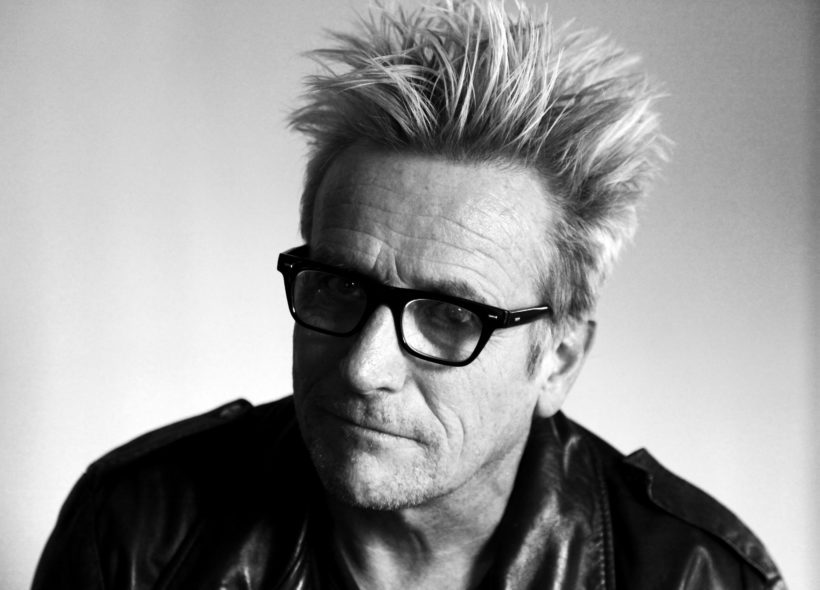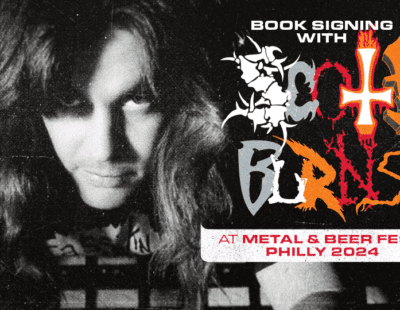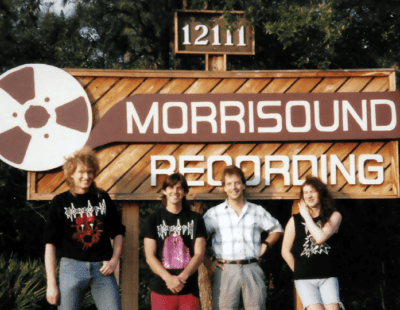
It’s a given now that if you start a metal or hardcore band you’ll be able to get on the road and tour. In the early days of underground music that wasn’t the case. Author Patrick O’Neil (who wrote about his descent into heroin addiction and armed robbery in Gun, Needle, Spoon) helped blaze those trails as a roadie and road manager for seminal hardcore bands like Dead Kennedys, Flipper, T.S.O.L., and more.
In his latest book Anarchy At The Circle K (Punk Hostage Press) O’Neil writes about those times in a narrative that’s a combination of Jack Kerouac’s On The Road, and Michael Azerrad’s Our Band Could Be Your Life. Anarchy is a hilarious, compulsively readable personal history of the formative days of hardcore music. It’s like the punk rock version of Rosencrantz and Guildenstern Are Dead: while many books focus on what happened to the people on stage O’Neil tells the tales of everyone on the periphery. Amazingly, O’Neil handled the grueling work of a roadie while a heroin addict – an addiction so severe it eventually led to armed robbery and a stint in San Quentin.
O’Neil talked to Decibel about writing Anarchy At The Circle K, the early days of hardcore, and life lessons from his years on the road. To get a taste of this book, check out O’Neil’s chapter on the police raid of Alternative Tentacles records during the Frankenchrist era which he graciously shared with us earlier this year.
This book is like a prequel to your first memoir Gun, Needle, Spoon. Why did you decide to wait to dig further into the past?
Gun, Needle, Spoon was fresh in my mind. I was out of prison and in recovery and trying to make sense of what my life was about. Anarchy was a book I wanted to write but didn’t know how to write at that point. It’s taken me a long time. It’s about the period when drugs were working. I don’t know if it’s right to call them golden years; it was a good time but also kind of a fucked up time. I had to write the first book to get here and clear the air.
Your recall for a lot of these events is incredible despite drugs. Were you writing back then?
No, I wasn’t writing until I was 40 when I was incarcerated. I was a visual artist and a roadie. I never wrote anything as a kid because I have dyslexia. I do have a good memory which is insane because I was totally loaded most of the time. With that said I have a horrible memory for addresses and phone numbers and names. I can meet people and recognize them and not even know their names (laughs).
One thing that occurred to me when I read Anarchy At The Circle K is how much the punk scene in the early to mid-80s was the Wild West. At one show you were slashed from your wrist to your elbow with a razor. People would punch or assault you.
It felt like there were no rules or that we were making them. It was totally DIY. We would just get in the van and drive somewhere and expect a show to be there. It would be some kid putting on a show at a VFW Hall or a Ukrainian Hall. There would be no security, sometimes a PA, and rarely a stage. There was this bizarre idea then that shows would happen and, somehow, they did. The beautiful thing is we put together a community across the country and decades later people can now play shows everywhere.
Why as a roadie were people always trying to hurt you?
(laughs). A lot of people wanted to hurt people like (Jello) Biafra and I tried to stop that. Our job was to keep the stage clear. At some point, people start looking at you as the authority or the man which is hilarious. One of my main reasons for keeping them off stage was I didn’t want them to break gear because then I would have to fix it. It would just add to the work. I had to try to keep things in order. We all pick our roles and that was my role – to be an enforcer. It’s funny because it’s anti-punk in some ways.
Rollins wrote about that in Get In The Van: people spitting on him or trying to hit him or stab him just because he was on stage.
Hardcore then was driven by younger white males. A lot of these kids would probably have otherwise played football and this became another contact sport. It was part of the whole scene. A lot of people didn’t like it because they took the level of violence in hardcore to a different level and then it started happening everywhere.
Biafra said in our Frankenchrist Hall of Fame that he sort of fell out of love with punk in the mid-80s because of the violence.
In the early days, we really felt like we were out there making a difference in the world. He (Biafra) used to dive into the crowd and surf and would be placed back on stage. Later on, when he dove in people would just start punching him and I’d have to come to get him.
When you write about pulling up in some of these towns it reminded me of the scene in Easy Rider where Billy, Wyatt, and George try to order in this restaurant, and one of the locals says: “I bet they don’t make the county line.”
There was a lot of resistance, especially in the South. There were two schools of thought: some people thought we could be the next Stones and other people thought we were weirdos. We’d be in a diner and cops would come in and ask for IDs and why we were there. It was harassment. Honestly, I just don’t navigate the south well because I don’t understand the heavy, embedded racism. That just doesn’t work for me. So being there was pretty hard. Sometimes it was more a subtle attitude of “you don’t belong here.” I tried to not be out late in a lot of towns – just stay in your hotel and don’t be obnoxious. But sometimes you would get out of the club at 2 a.m. and it was inevitable.
Later in the book, you walk into a poor African American neighborhood and stumble on a bar. Not only are the people nice but you end up partying with them.
That was in Eudora, Arkansas when T.S.O.L.’s van broke down (laughs). Meanwhile, the white section of town didn’t want anything to do with us.
When you wrote Gun, Needle, Spoon you showed the horrific consequences of addiction. In this book, drugs were involved but a lot of it seemed like a fun crazy adventure. Was it hard to be honest about those times?
Well, drugs work and that’s why I started taking them. I stopped feeling so socially awkward and things started happening in my life. Anarchy is about when drugs were working. There is definitely a part of the book where they stop working. But there is a certain time when you start using where things are magical. Every alcoholic has experienced the same thing. It was hard to look back at using them then because I couldn’t condemn all of it. It wasn’t always nice to be dope sick in some podunk town but I thought being a junkie was part of being a punk rocker.
You write about one night at the Mabuhay Gardens in San Francisco at a Dead Kennedys show. A metal show is happening across the street. The crowds don’t mix. Just a few years later the metal and punk scenes started intertwining with DRI, COC, Agnostic Front and so many other bands. Was crossover starting to happen when you toured?
It was. You would see Slayer shirts at Kennedys shows. At a show in Chicago on Halloween, Mercyful Fate played an afternoon gig. The same kids who went to the Mercyful Fate show waited around and then came to our show. There were also a lot of metal tones coming out in hardcore. Look at Suicidal Tendencies. They were supposed to be a punk band and they were totally metal! Even Bad Brains courted metal. I was at a Judas Priest concert at the Cow Palace in San Francisco in 1982 and the roadies were wearing DKs shirts.
Did you ever think we’d still be listening to Dead Kennedys, Flipper, or T.S.O.L. four decades later?
For a while, I thought this whole thing would never end. My involvement in punk came to an abrupt end in 1987 when I got the call from (East Bay) Ray that the Kennedys were done. I was about to get my malaria shots for a tour. Then Will Shatter from Flipper died and T.S.O.L. went the hair metal route.
What is your writing process? Do you try to work every day?
I used to be a binge writer who would try to write as much as he could at once. That’s not sustainable. I now get up early every morning and write. I had to learn that if I wrote 50 or 1000 words when I worked, the book would still get done. So I get up and do it every day. I also try to put some deadlines on sections. For a while, I was in a writing group and would meet once a month. I’d write like 20 pages of Anarchy and share them. I work every morning and do self-imposed deadlines. I write in the morning, edit at night, and start fresh every day.
Metal and punk bands that tour now have a roadmap. People know the clubs that book punk or metal. They know the promoters. Your generation created that roadmap.
Absolutely. There were young kids booking shows in small towns who eventually became bookers or promoters. One time in Chicago Greg Allman was playing a gig in a small theater and the Kennedys were pulling like 3,000 people. People quickly saw it as a viable market and it eventually became just another commodity.







